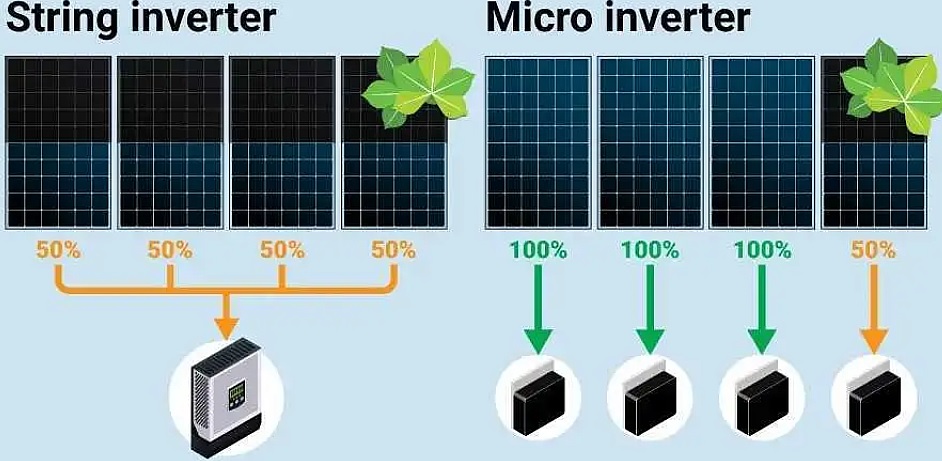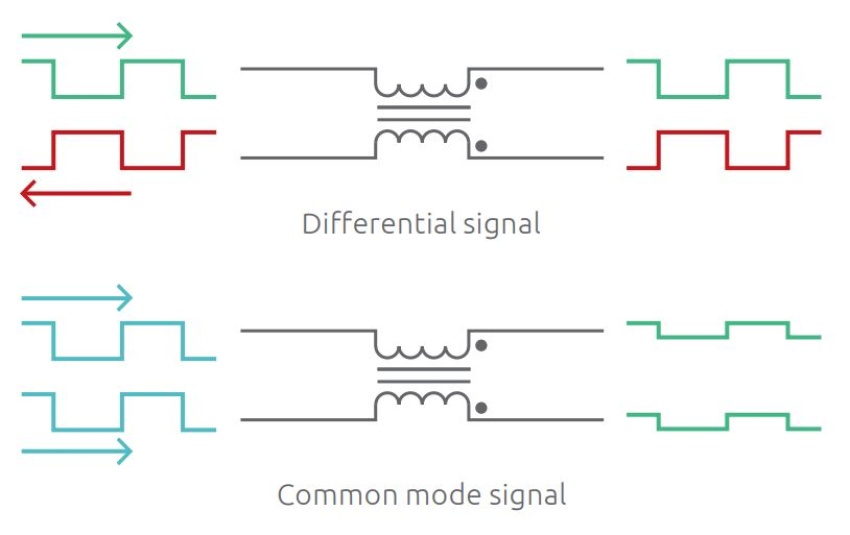Very good video what is difference between Mico and String Inverters
You have to watch it before install a solar system.
Enphase MI system is much expensive than String inverter,
even more than Optimizer system.
But, String inverter system need 6+ panels in series, it means there is a minimum number of panels under similar sun-light condition. but, MI system do not have the minimum requirments, technically 1 panel.
so, if have small zone & multi zones (more than 2), MI should be better
except this condition, There is no advantage via the extra cost
https://www.youtube.com/watch?v=UQ9Szhl1ceQ
Have to watch this video ~ Really ~ Really important
Most solar users are fooled by the micro inverter company,
Their advertizing is a fake ~
Typical FAKE INFORMATION

String Inverter
The pannel has connected in series. when some panel has shaded, it will affect on VOLTAGE not current. so, and, power will be by-passed on the the shade panel, total power output will be 100-100-100-50, the drawing for string inverter is 100% fake, or they just ignore the role of by-pass dioe,
Micro Inverter
when partial shading, it will reduce the voltage not current, and there are 3 or 4 sections in a panel, and each section has by-passed using a diode. if the panel has 3 sections (60-72 cell), voltage will drop to 2/3 level. Even shade a SINGLE cell. if 36~39V system voltage drop to 2/3, the votlage output with the same current will be 24~26V. UNFOTUNATELY, most micro inverter need higher than 27V, effectively 29~30V. So, Even 1 CELL has shaded, MI will just output 5-10% power which has generated by the diffusion light. so, 100-100-100-10 are the correct otuput in the drawing.
NEVER FOOLED, Practically, String inverter will ouptut more than 99% of MI system, even better long term.
If someone ask, when MI system is better ?
I want to say when have small sections. you need at least 6+ panels for start-up and 8~12 panels for the best efficiency in a section (similar light condition). and, the most string inverter has 2~4 MPPT line. if there the section size is less than 6, can not use the section in case of string inverter. and, if the section number is more than 4, need multiple inverters. example,
BUT, micro inverter system free from this requirments.
It is the real advantage of micro-inverter system,
Any other explanations are 99% BS
We knew Enphase Envoy and Inverters are communicating using Power Line Carrier,
The Envoy IQ is using Line-to-Line Singal instead Envoy-S's Line-to-N/G Signal.
It is a huge difference, because Envoy IQ is generating Differential mode signal
and, OLD Envoy is generating Common mode signal
To filter the signal from my neighborhood (he has installed Solar System last summer, unfotunately, he & I under the same utility tranformer). To solve the cross domain traffic issue, I need to filter the differential mode signal.
I have installed RP230-30-10-S between IQ combiner busbar And Wire_to_load_center.
It is suggested for Envoy-S (Line-to-N/G) system. but, Double stage filter has a good filtering on DM signal. Especially, this model shows 60dB insertion loss on DM. so, I have expected, it will filter the signal.
Insertion Loss (dB) = 20 * log10 ( Unfiltered / Filtered)
60dB means, 20 * 3 = 1000/1, the signal should be filtered by 1/1000 at 150kHz
Even consider some decay at 100kHz, the filtering performance should be 1/100 or better.
Leakage current of this filter is 1.8mA, it is pretty high loss
but, envoy is showing ‘Communications from other Envoy(s) have been detected’ early morning. And it is disappearing till evening, and showing again.
I have installed GTX-2300-Y02 between Wire_from_envoy and Breaker_Load_Center
Insersion loss is around 20dB in common mode. there is no differential value.
I am expecting around 10dB minimum, but, the leakage current is 0.5mA,
Too expensive to use it,
https://www.mouser.com/ProductDetail/KEMET/GTX-2300-Y02?qs=yqaQSyyJnNgbwvs18djAZg%3D%3D
Load center and combiner has located as below
MI - Combiner - RP230 - GTX2300 - Critical Load Center - XW 6848 - Main Load Center - Grid
Unfutunately, it can not solve the issue,
the message come again and again ~ like a die hard ....
Wait a minitue, just thinking again,
New Envoy is Line-to-Line communication, so, I have to remove/block a differential mode signal,
it means, the common mode filter is not working.
- Envoy-S same as Common Mode Signal
- Envoy-IQ same as Differential Signal
If install Ferrite Core on L1/L2, yes, it should not working -.-, that is just for old Enovy ONLY. !!!!
GTX-2300, it is a typical single stage common filter, it is good on common noise, and, have some filter for differential mode noise, i feel, that is not strong enough.
and, RP230-30-10, It is double stage filter, it have 60dB insertion loss on DM at 150kHz.
Unfotunately, those filters can not block the signal and, my envoy still detect the other Envoy(s).
BUT, I feel so strange,
(1) it is detected when early morning - when MIs start to work
(2) it is detected when evening - when MIs stop to work
(3) sometime at evening
so, I have tried to check the noise level and filtering level using SA
it makes me so disappointed, because I can not detect any signal from outside for couple of hours.
I have checked my device again, turn-on Enovy and check the signal
My equiment can detect a communication signal which has been generating from my Envoy.
I can find a signal, and confirm the filtering even I can not find the exact level of filtering.
[SO, THERE IS A BASIC QUESTION]
How my Envoy detect the other Envoy(s) signal ?
How my Envoy detect the other Envoy(s) signal after 2 filters ? there is 60dB insertion loss. Is it possible to be detected ?
ANYWAY, most power line filter is designed to minimize the power loss using small capacitor.
It means, not strong enogh on DM filtering, BUT, can not explain the the message while low power mode. Because filter will lost the performance while higher current mode,
I have ordered Q-LCF-064-1P-1 to make sure,
Because it said, IQ compatible,
75W maximum loss (via the maximum current), should be under 1/16 at my appliaction.
anyway, around ~19Wh is so high power consumption
75W x 1/16 & 4.15h = 19Wh per day (or 7.1kWh per year)
Maybe need to try for the DM mode noise

